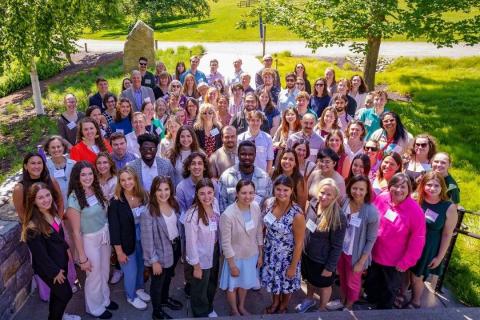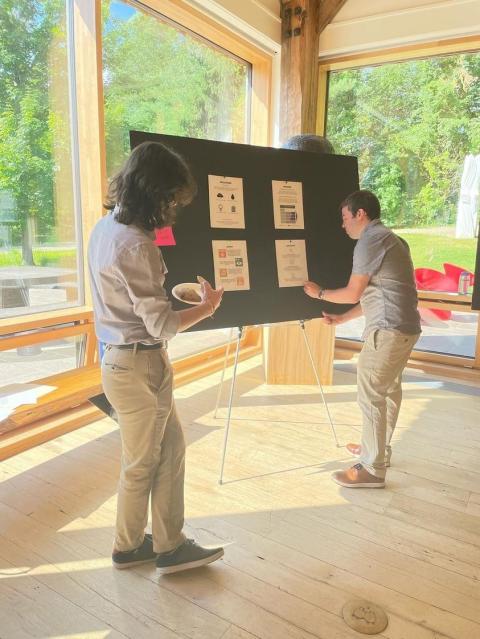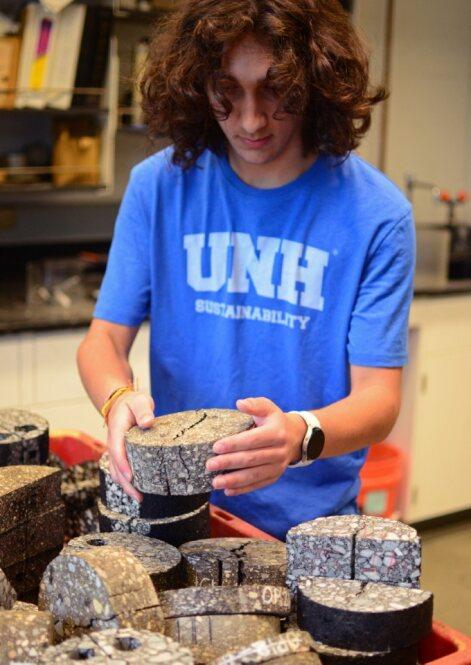UNH Sustainability Fellowship
Welcome to our 5 Things I Learned blog series, where UNH students from all colleges and majors share the UNH experience that changed everything for them and what they learned from it. From studying abroad and summer internships to research and leadership in student organizations, follow along to see what you can learn by stepping out of your comfort zone and saying "yes" to that new opportunity on our campus.
Read on to learn about five things Pedro, a mechanical engineering major, learned as a Sustainability Fellow at The College of Engineering and Physical Sciences Technical Service Center.
UNH students who complete Sustainability Institute Fellowships take on roles in educational institutions, nonprofits, municipalities and industry. The College of Engineering and Physical Sciences Technical Service Center (CEPS TSC) provides technical, operational and logistical support to CEPS and manages the CEPS Makerspace (feel free to stop by in Kingsbury N130). My role as a fellow was to review the waste practices of the college. I worked mainly with civil engineering waste and electronic waste. During my time, I was able to revise waste practices to divert up to 20 tons per year of construction and demolition waste to recycle and catalog unused scientific instruments for sale to bring back over $20,000 in revenue.

2023 Sustainability Fellowship cohort
Photo credit: UNH Sustainability Institute
1. People at UNH Are Supportive
At UNH, I can confidently say that every person I’ve interacted with cared about my and my peers' success. The Sustainability Fellowship struck a perfect balance of fun and education. The advisors were always available to chat and scheduled weekly meetings where we could voice our opinions. Working a full-time job, my hours were still flexible, and I was given ample personal time.
2. Sustainability Is Applicable to Every Field
Throughout my time as a Sustainability Fellow, I interacted with the other fellows and learned about their projects. Project topics included waste reduction, education, outreach and more. Sustainability work is applicable to any field of study, whether you are a mechanical engineer like me, an economics major, or an education major. Anyone passionate about sustainability has a position in the field.

Pedro and another fellow preparing for presentations
Photo credit: Cassie Lafleur
3. Networking Opportunities Are Everywhere
You will always hear people tell you to network with professors, peers, staff, researchers, etc. This is a lot to take in, that your future career is so dependent on networking. In reality, networking is just a fancy name for talking. How many people do you have the opportunity to talk with each day? Talk to a new friend, go up to a professor and introduce yourself; it is not necessary to have an important question or even talk about the class they are teaching.
4. Always Take Chances and Try New Things
Even though the work I did during my Sustainability Fellowship was not exactly what I envision myself doing in the long run, I was still interested in how sustainability can be related to engineering. The fellowship brought me closer to my academics and deepened my connection to my degree at UNH. Being able to actively develop and implement sustainable measures in my college gives me pride.

Pedro holding an asphalt testing sample used in Civil Engineering labs
Photo credit: UNH Sustainability Institute
5. Do Not Worry About Being Inexperienced
Nerves and self-doubt can kick in when trying something new, especially in a professional environment. Do not doubt yourself; while you may not have the decades of experience some industry professionals have, you bring in a new perspective. I was able to bring in new innovative ideas that were supported and implemented. It is always worth a shot to apply for something and a fresh set of eyes and an outside perspective are more valuable than you think.
read more "5 things I learned blog posts"
learn more about sustainability fellowships at UNH
read more sustainability blog posts
related posts:
Nate's UNH Day in the Life
Today we travel to Minneapolis, Minnesota with Nate Maybach ’25, a dual major in sustainability and women's and gender studies. From training with a collegiate cross-country ski training program, to working a Sustainability Fellowship, follow along on this day in Minnesota! read more about nate